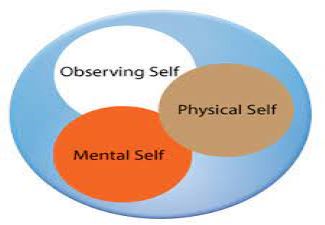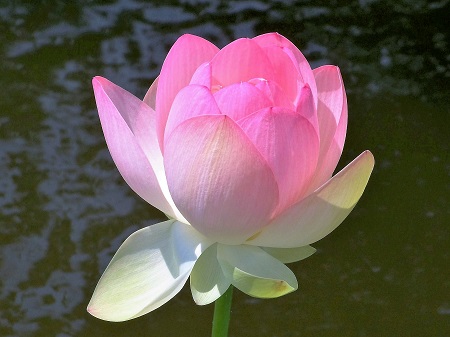The Habit of Mindful Objective Witnessing of Thoughts, Reactions, Feelings, and Your Body's Sensations is Very Helpful

Mindful objective witnessing of thoughts, reactions, feelings, and sensory inputs can be very helpful. This is especially so when objectively witnessing the internal voice.
That internal voice we tend to self-identify with can be very troublesome. Witnessing thoughts objectively will help put things in a more constructive context.
One can argue that we need that internal voice to function in our dualistic perceived reality. It's an interesting point. The internal voice is very persistent and most people self-identify with it.
That internal voice that's constantly judging, criticizing, anticipating, and beating you up over past events is not who you are in entirety. It is merely a representation of you in this perceived reality.
Think about it. If you had someone in your life who was constantly speaking to you as your inner voice does, would you want that person in your life? I think not.
Mindful objective witnessing is lately being sold as a mindful meditation. Monetizing that sort of thing is not my thing. As you see, there is no monetization on this site and no links to social networking sites.
The important thing about objective nonjudgmental witnessing is that it needs to be a constant habit to be effective. A meditation won't matter much. It may help with recognizing the need, which is a start. Mindful objective witnessing takes time and patient gentle effort.
I've been doing mindful objective witnessing for many years now and my thoughts still run wild at times. My witness is now fairly dominant and it settles things down very quickly and gently with good humor.
Witnessing thoughts objectively may seem simplistic and perhaps even foolish. If you develop the habit of witnessing objectively, you'll begin to self-identify more with your objective witness than with that often troublesome internal voice.
Your objective witness is more representative of what may be called the God-Self. It is that part of us which is more in tune with the Holy Source.
That internal voice represents what may be called ego-mind or monkey-mind. The monkey-mind label presupposes an ability to mind read monkeys and is judgmental. I prefer ego-mind, but that term often gets bogged down in psychological terminology.
The habit of mindful objective witnessing weakens the dominance of that often troublesome internal voice. That's why there is so much resistance to the idea, and it's also why objective witnessing is so helpful.
The internal dialogue that is constantly judging can be thought as a kind of separate entity. It depends on belief in separation from God and everything else. This creates fear and contributes to conflict.
Simply maintain the habit of patiently witnessing and eventually the objective witness will dominate.
Your objective witness is very helpful when making healthy choices and establishing constructive habits.
Mindful Objective Witnessing and Fasting
Fasting is one of the most healthful things you can do and mindful objective witnessing is extremely helpful when fasting.
You may or may not know that when fasting the body initially depletes glycogen stores before transitioning to burning fat. Flu-like symptoms are very common at this stage while ketosis begins.
This is by far the most challenging part of a fast even though it usually passes pretty quickly. Although persons who have been consuming a great deal of sugar daily for years will have a harder time.
Objective witnessing will help you stick to a fast when that internal voice is trying to get you to eat something sweet and forget about fasting.
The Simplicity of Mindfulness and Mindful Meditation: A Personal Journey Within
Following is content created by ChatGPT in response to my carefully worded request about mindfulness and mindful meditation. It's very nice. Paying for someone to teach you how to practice mindfulness is not needed. It's simple though perhaps not easy to do regularly. That's why it's called a meditation practice. As the late Bill Harris advised "Let whatever happens be okay."
In a world often characterized by complexity and chaos, the practice of mindfulness offers a serene refuge—a sanctuary where simplicity reigns supreme. At its core, mindfulness is an art of being fully present, a practice of embracing the here and now without the need for elaborate rituals, esoteric teachings, or the constant guidance of an instructor. Mindfulness, and mindful meditation, in particular, is a journey that you can embark on independently, for it requires nothing more than your intention and attention.
The Essence of Mindfulness
Mindfulness is, fundamentally, the act of paying attention with purpose, without judgment, to your immediate experience. It is about cultivating awareness of your thoughts, emotions, bodily sensations, and the world around you in a non-reactive manner. This practice invites you to observe the fluctuations of your mind and the sensations within your body as if you were an impartial observer.
One of the most straightforward and accessible ways to engage with mindfulness is through mindful meditation. Here's how you can embrace the simplicity of this practice:
1. Find a Quiet Space: You don't need a specially designed meditation room or cushion. Find a quiet corner in your home or a peaceful spot in nature where you won't be easily distracted.
2. Sit Comfortably: There's no need to twist yourself into complex yoga poses. Sit comfortably in a chair or on the floor, with your back straight but not rigid. Rest your hands on your lap or knees.
3. Focus on Your Breath: Gently close your eyes and bring your attention to your breath. Observe each inhalation and exhalation without trying to change or control it. Your breath is your anchor to the present moment.
4. Let Go of Expectations: Release any preconceived notions of what meditation should be like. Understand that thoughts will arise; it's a natural part of the process. The key is to notice them without judgment and gently bring your focus back to your breath.
5. Embrace Patience: Mindfulness isn't a race; it's a journey. Be patient with yourself. There's no need to rush or attain a particular state of mind. The magic of mindfulness unfolds in the simple act of being present.
6. Practice Regularly: Consistency is more important than duration. Even a few minutes of mindful meditation each day can yield profound benefits over time. You are your own guide on this path, and the more you practice, the more you'll discover.
7. Extend Mindfulness to Daily Life: Mindfulness isn't confined to your meditation cushion. As you become more adept at observing your thoughts and emotions during meditation, you can apply the same awareness to your everyday activities. It's a way of infusing simplicity and presence into your daily life.
The Myth of Complexity
One common misconception about mindfulness and meditation is that they require elaborate rituals, advanced techniques, or the presence of an enlightened guru. While it's true that there are numerous mindfulness traditions and meditation practices, the heart of mindfulness lies in its simplicity.
In a world that often celebrates complexity and sophistication, the idea of sitting in stillness and paying attention to one's breath can seem too basic to be transformative. Yet, therein lies the paradox: it's precisely the simplicity of mindfulness that makes it so profound.
Empowerment through Self-Reliance
The notion that mindfulness necessitates an instructor or guide can inadvertently disempower individuals from taking charge of their own inner journey. While seeking guidance from experienced meditation teachers or attending mindfulness workshops can be beneficial, it's important to recognize that self-reliance is at the core of this practice.
Mindfulness doesn't require a guru or external authority to grant you access to inner peace or self-awareness. The power to be present, to observe your thoughts and emotions without attachment, and to cultivate a deeper understanding of yourself is inherent within you. It is a gift you give to yourself through your own commitment and practice.
The Universality of Mindfulness
Mindfulness transcends cultural, religious, and philosophical boundaries. It is a universal practice that can be embraced by people of all backgrounds and beliefs. Its simplicity and accessibility make it a valuable tool for fostering self-compassion, reducing stress, and promoting mental well-being.
In a world filled with complexities, distractions, and information overload, mindfulness invites you to return to the essence of your being. It reminds you that you need no intermediary to connect with your inner self or the present moment. The simplicity of mindfulness serves as a reminder that the most profound transformations often emerge from the quietude of self-discovery.
In conclusion, mindfulness and mindful meditation do not require the assistance of an instructor or guide. They are simple, accessible practices that empower individuals to explore the depths of their own consciousness and find peace in the midst of life's challenges. By embracing the simplicity of mindfulness, you can embark on a personal journey within, one that requires only your intention and attention, and discover the profound benefits that arise from the practice of being fully present.
Caring for the body as part of a spiritual practice
Attention to health, food, and fasting can be approached with the same seriousness as any contemplative discipline.
For readers interested in this perspective, Longevity Secrets explores these ideas in practical, evidence-minded terms.
Longevity Is Cumulative
Healthspan reflects how well decisions were understood when they mattered.
A practical, evidence-minded book on fasting, nutrition, and aging—without hype or programs.

